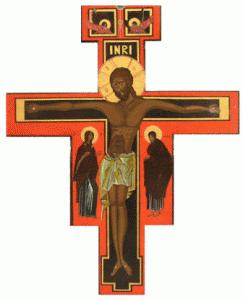Why was the Son of God crucified?
Why was Jesus of Nazareth killed?
In an attempt to interpret history we can say that Jesus of Nazareth was a victim of one of the methods of capital punishment in the Roman Empire: crucifixion.
The build-up to this mishandling of justice was marred by the interplay of institutionalised religion and corrupt politics.
Jesus of Nazareth had gone around the land of Palestine stretching from Galilee in the North to Judea in the South, and across Samaria, for a period of three years, proclaiming a new message – the good news of the Kingdom of God! God is here and now! God can be called, ‘Our Father’. This was the core of his message. This carpenter from Nazareth had gathered a band of disciples who called him, ‘rabbi’. Some people thought he was a prophet – their position was particularly supported by his miracles. Jesus did accept that he was sent by the father! But others rallied around calling him, the messiah! But Jesus himself alluded to being the Son of God: he introduced himself as the I AM – as God introduced himself to Moses (Ex 3:14); he said things like: I and the Father are one! Before Abraham was, I am! I have come from the Father, (not just sent by the Father)! But these things do not fit into the schema of the Jewish religion. This was blasphemy. Nowhere in the Old Testament is a clue to the connection between messiah and Son of God (though in Psalm 2 David is referred to the son of God in a figurative sense). The messiah does not need to be the Son of God. This claim lies outside the Jewish expectations. Institutionalized religion tends to fossilise divine mysteries and put God into a straight-jacket. So, Jesus was supposed to be stoned to death. But he was too popular among the people.
How could this religious crime be punished under the law of the Roman colonial power? Oh yes, he called himself the king of the Jews. That is a concept inherent in the idea of the Jewish messiah. He is to be a king like David. As for Jesus, he did talk of a kingdom. But he spoke about the Kingdom of God – the reign of God – made manifest in his own person. A kingdom maintained not by armies and authority, but by the bond of love between human hearts, and as a response to the love of God. The Roman leaders, Pilate, to be precise, were able to see a loophole in the argument of leaders of the Jews. Whatever his religious claims were, Jesus did not seem to be a political criminal – this meek and humble man seemed far from being a revolutionary of some sort. And yet, for the Roman officials the only way of avoiding trouble at this difficult time was to please the leaders of the Jews. So Jesus becomes a victim of faithless religion and lawless politics. He is crucified.
But then, if Jesus of Nazareth was indeed the Son of God, why then did he not save himself? Why God had to die?
We enter into a theological reflection. We can understand this in two ways: one, in reference to the sin of Adam; and another, in reference to love of God.
1. St Augustine puts it this way: the sin of Adam was a sin against God. This direct sin against the Divine deserves a divine punishment. No human being can really do reparation for this sin, nor take up this divine punishment. Therefore, God himself has to undertake this punishment, and do the reparation in such a way that the relationship between God and humans can be re-established.
2. But I personally prefer the 2nd explanation, which is strongly supported by the New Testament. God let himself die on the cross because of LOVE – because of His love for humankind; because of His love for me.
Let us consider it this way. You are a human being… you see cockroaches, how miserable they are. You love them and you want to show them how they can live a higher life. Let us suppose that you have the power to become a cockroach. So that is what you do: you become a cockroach: you live like them, you eat like them, you move around them… and then you empower them to come to a higher state of existence. But they? They reject you, condemn you and kill you!
This is a poor analogy, but it brings out in a limited way the meaning of the mysteries of incarnation and redemption. God so loved the world that he gave his only son (John 3:17)… but he becomes a victim of human freedom. God created us with our free will, we can use this free will to choose God or to reject him. The events we commemorate today tell us how human beings chose to reject the love of God. This is history. But it is also a history today in my own person.
The message that we can carry home today as we silently wait for the resurrection is… am I ready to do make an exercise of my free will to respond to the love of God made manifest in Jesus? He says (Rev 3:20), “Behold, I stand at the door and knock; if any one hears my voice and opens the door, I will come in to him and eat with him, and he with me.”
Are we willing to open the door of our hearts to him?
